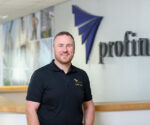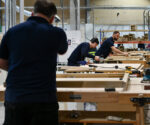New generation of PVC made from residue of wood features in project

Biovyn™, a new generation of PVC – made from the residue of the wood pulp process, instead of purely gas and oil – is about to make the next generation proud. It has been commandeered for a new ‘fossil-free’ pre-school in the Swedish city of Gothenburg, which has ambitious plans to cut the city’s greenhouse gas emissions by 75% by 2050.
For INEOS-owned Inovyn, the brains behind this new PVC, it is a great honour to be involved in what is known as The Hope Project. “It is an innovative project to prove the concept that fossil-free construction is possible,” said Inna Jeschke, Marketing Manager at Inovyn.
“It has brought together a range of sustainability experts, innovators, entrepreneurs and suppliers to deliver a truly sustainable community building.”
Inovyn has partnered with Pipelife Sweden which has been commissioned to supply the sustainable PVC pipes.
“We have managed to lower the carbon footprint for these pipe installations by no less than 76%,” said Pipelife project manager Ove Söderberg.
The beauty of Biovyn™, although more expensive than conventional PVC, is twofold. It is not only made primarily from a renewable raw material not competing with the food chain but, compared to conventionally-produced PVC, greenhouse gas emissions are cut by more than 90% during production.
“The sustainable and innovative nature of Biovyn™ make it the perfect choice for this flagship project,” said Ove. Biovyn™, which was revealed to the world in October 2019, is the world’s first commercially-produced, bio-attributed PVC.
And it has been winning fans – and sales – all over the world ever since.
“We have had amazing interest from all corners of the globe and also from all possible applications, from direct customers in the flooring and pipe industries and a lot from brand owners, including a prominent car manufacturer,” said Inna. But it didn’t happen overnight. First INEOS O&P in Köln, Germany, had to be satisfied that they could secure the biomass – the renewable raw material.
Once the team in Köln had done that, they had to ensure it could be converted into bio-ethylene in its existing cracker. Once that hurdle had been cleared, the bio-ethylene was piped directly to Inovyn’s plant at Rheinberg in Germany where it was used to produce Biovyn™.
The bio-attributed PVC’s sustainable credentials have already been certified by The Roundtable on Sustainable Biomaterials (RSB), whose global mission is to support best practice for sustainable bio-material production. PVC is essential for modern life today and is already widely used in the renewable energy sector, in cars, buildings, floors, technology and in medical equipment.
“Biovyn™ pushes sustainability even further,” said Luc Castin, Business Manager, Inovyn. Rolf Hogan, Executive Director of RSB, has described Inovyn’s latest PVC product as a true leader in the emerging circular bio-economy.











